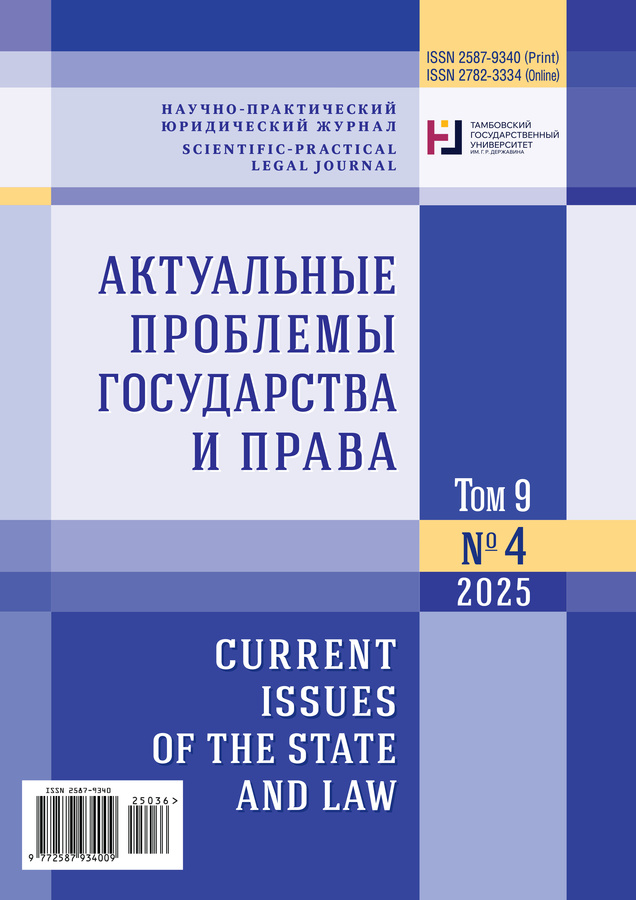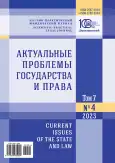Парламентское расследование как инструмент противодействия коррупции и злоупотребления власти
- Авторы: ХОЛИКОВ И.В.1, ХОЛИКОВА А.И.2
-
Учреждения:
- ФГНИУ «Институт законодательства и сравнительного правоведения при Правительстве Российской Федерации»
- ФГБОУ ВО «Московский государственный лингвистический университет»
- Выпуск: Том 7, № 4 (2023)
- Страницы: 551-557
- Раздел: Общая теория и история права и государства
- URL: https://journal-vniispk.ru/2587-9340/article/view/303720
- ID: 303720
Цитировать
Аннотация
Рассмотрен парламентский контроль и парламентское расследование как его компонент (вид) в противодействии коррупции и злоупотребления власти. Отмечена правовая и социальная природа отечественного института парламентского расследования, обоснована его детерминация в российском праве. Раскрыта нормативная правовая основа проведения парламентского расследования, особенности правовой регламентации процедуры его практического проведения. Приведены субъекты реализации парламентского расследования и описаны объекты, на которые оно направлено. Отмечено, что институт парламентского расследования не заменяет собой другие формы государственного контроля или надзора, а также деятельность по отправлению правосудия. Указано, что основаниями для проведения парламентского расследования могут также являться обстоятельства, связанные с возникновением и негативными последствиями чрезвычайных ситуаций природного и техногенного характера, а также факты, явно свидетельствующие о коррупции должностных лиц. Проанализирован правоприменительный опыт в области проведения парламентского расследования в России и зарубежных странах. Выявлено, что в России нет сформированной эффективной практики реализации данной процедуры, поскольку принятый обсуждаемый федеральный закон за весь период своего существования ни разу не применялся. Это свидетельствует о необходимости качественной проработки уже имеющейся нормативной базы, в частности упрощения процедуры инициирования парламентского расследования.
Об авторах
Иван Владимирович ХОЛИКОВ
ФГНИУ «Институт законодательства и сравнительного правоведения при Правительстве Российской Федерации»
Автор, ответственный за переписку.
Email: iv_kholik@mail.ru
ORCID iD: 0000-0003-0421-5829
доктор юридических наук, профессор, профессор кафедры международного права, главный научный сотрудник отдела международного права и сравнительно-правовых исследований
Россия, Российская Федерация, 117218, г. Москва, ул. Большая Черемушкинская, 34Анастасия Ивановна ХОЛИКОВА
ФГБОУ ВО «Московский государственный лингвистический университет»
Email: kholik792001@mail.ru
студент Института международного права и правосудия
Россия, Российская Федерация, 119034, г. Москва, ул. Остоженка, 38, строение 1Список литературы
- Абаева З.Р. Парламентское расследование как форма парламентского контроля в субъектах Российской Федерации // Конституционное и муниципальное право. 2023. № 3. С. 26-31. https://doi.org/10.18572/1812-3767-2023-3-26-31, https://elibrary.ru/kwszkl
- Чимаров Н.С. Сущностные признаки Российской модели парламентского расследования в контексте конституционализма // Вестник Санкт-Петербургской юридической академии. 2023. № 1 (58). С. 63-66. https://elibrary.ru/ghrwft
- Федченко Е.А., Васина Д.М. К проблеме формирования нормативно-правового регулирования парламентского контроля в Российской Федерации // Бухучет в здравоохранении. 2020. № 5. С. 50-57. https://doi.org/10.33920/med-17-2005-06, https://elibrary.ru/enjpwz
- Наумов П.Ю., Захарцев С.И., Холиков И.В., Большакова В.М. Ценность права и правовые ценности в глобализующемся мире (Аксиологический обзор книги «Государство и право: права человека и мировой порядок, основанный на верховенстве права») // Государство и право. 2023. № 9. С. 64-72. https://doi.org/10.31857/S102694520024304-5, https://elibrary.ru/xeaqeb
- Холиков И.В., Большакова В.М., Наумов П.Ю., Зелепукин Р.В. Ценности и смыслы главного судебного акта XX века: аксиологические концепты книги А.Н. Савенкова «Нюрнберг: Приговор во имя Мира» (Материалы дискуссии) // Государство и право. 2022. № 10. С. 51-62. https://doi.org/10.31857/S102694520021788-7, https://elibrary.ru/imtjuc
- Зелепукин Р.В., Холиков И.В., Кроткова Н.В., Землин А.И. Тенденции и проблемы современного права. Обзор VII Международной научно-практической конференции «Тамбовские правовые чтения имени Ф.Н. Плевако» // Государство и право. 2023. № 10. С. 167-175. https://doi.org/10.31857/ S102694520028159-5, https://elibrary.ru/mdcfby
- Гаврилов С.О., Глебов И.Н., Чукин С.Г. и др. Право в точке бифуркации: обсуждение концептуального исследования военных проблем международного права (Дискуссия в формате «круглого стола» по материалам гл. 6 «Военные проблемы международного права» т. III монографии «Военное право») // Государство и право. 2022. № 12. С. 59-67. https://doi.org/10.31857/S102694520023301-2, https://elibrary.ru/xhovfe
- Холиков И.В., Милованович А., Наумов П.Ю. Динамика функционирования международного права в условиях трансформации современного миропорядка: постнеклассический подход // Журнал российского права. 2022. Т. 26. № 11. С. 132-148. https://doi.org/10.12737/jrl.2022.122, https://elibrary.ru/abbllm
- Холиков И.В. Теоретико-правовая характеристика современных глобальных вызовов и угроз в сфере здравоохранения // Актуальные проблемы государства и права. 2022. Т. 6. № 4 (24). С. 547-555. https://doi.org/10.20310/2587-9340-2022-6-4-547-555, https://elibrary.ru/lyihul
- Дамаскин О.В., Холиков И.В. Актуальные проблемы защиты российской государственности и национального суверенитета в современных условиях // Представительная власть – XXI век: законодательство, комментарии, проблемы. 2017. № 4 (155). С. 1-5. https://elibrary.ru/yzkccv
- Дамаскин О.В., Холиков И.В. Актуальные вопросы правового обеспечения сил и средств обороны и безопасности России в условиях современных военных конфликтов // Вестник Академии военных наук. 2018. № 4 (65). С. 121-128. https://elibrary.ru/apxxib
- Зубарев А.С. Об отражении правоприменительной практики в законодательстве о парламентском расследовании // Вестник Воронежского государственного университета. Серия: Право. 2017. № 2 (29). С. 72-85. https://elibrary.ru/wfydia
- Смирнов Е.Е. Основные цели и особенности Закона «О парламентском контроле» // Аудитор. 2013. № 7 (221). С. 3-9. https://elibrary.ru/rbzhyf
- Волчкова Н.Н. Парламентский контроль в зарубежных странах // Известия Тульского государственного университета. Экономические и юридические науки. 2015. № 1-2. С. 43-49. https://elibrary.ru/tqmnwr
- Сущенко П.В. Некоторые вопросы конституционно-правовой регламентации парламентского контроля // Электронное приложение к Российскому юридическому журналу. 2019. № 2. С. 61-72. https://elibrary.ru/wmjgaj
- Баранова Е.А. К вопросу о значении парламентских расследований: зарубежный и отечественный опыт развития (историко-правовой аспект) // Пробелы в российском законодательстве. 2015. № 1. С. 86-89. https://elibrary.ru/tkqliz
- Гусева Д.Е. Современные институты парламентского контроля европейских государств (Германия, Франция, Великобритания, Россия) // PolitBook. 2016. № 3. С. 168-181. https://elibrary.ru/ygklqr
- Кочиева О.А. Конституционно-правовые основы парламентского контроля в Республике Южная Осетия // Актуальные проблемы российского права. 2021. Т. 16. № 10 (131). С. 191-201. https://doi.org/10.17803/1994-1471.2021.131.10.191-201, https://elibrary.ru/hbbhhm
Дополнительные файлы









